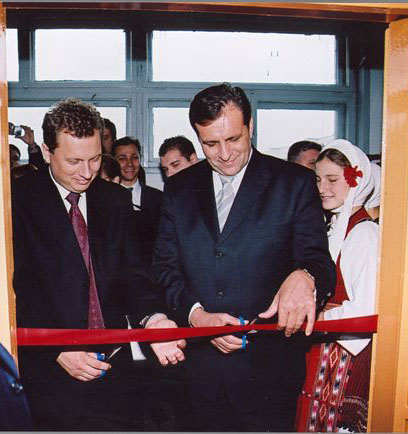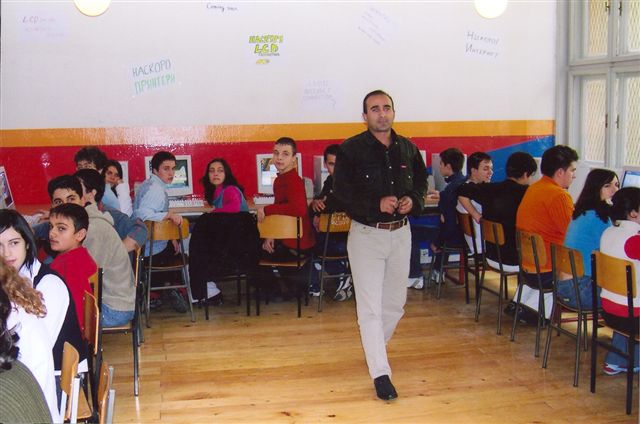E-school.Mk: Improving ICT Quality and Promoting Tolerance in Macedonia
Preparing Macedonian youth for employment through ICT-informed education programs and improving quality and relevance of instruction at the secondary level
December, 2003
Following the refugee crisis from the Kosovo war of the 1990s and the ethnic-Albanian uprising in 2001, the Government of Macedonia, mindful of the difficult lessons learned by its neighboring states, decided to rebuild communities, one town at a time. Recent community initiatives have improved basic road infrastructure between majority ethnic Macedonian and majority ethnic Albanian towns, and have also helped foster partnerships across ethnic divides.

First computer lab opens: Gevgelija ribbon cutting ceremony with President Trajkovski.
For example, in the summer of 2002, hundreds of youths volunteered to clean their littered streets while others engaged in community sports camps promoting ethnic tolerance and understanding. It is evident that the Government of Macedonia, its people, multilateral organizations, various bilateral organizations and non-governmental organizations (NGOs) are moving forward to alleviate ethnic tensions and provide new and improved economic opportunities for Macedonians.
The “E-school. Mk” activity is a product of this new direction
in Macedonia. This USAID/Macedonia dot-EDU project is preparing Macedonian
youth for employment through ICT-informed education programs and improving
quality and relevance of instruction at the secondary level.
The “E-school. Mk” activity has taken the donation of 2,000
computers from the Government of China to the Government of Macedonia and
created a nationwide buzz among students, teachers, administrators and government
officials. At the epicenter of this excitement are plans to fully equip
computer labs in every secondary school in the country. These labs will
receive substantial technological inputs such as software, peripherals and
additional hardware. Participating educators will build capacity in integrating
ICTs across the curriculum, rather than treating ICT as a distinct and separate
subject. They will also learn how to use ICTs to help shift from traditional
teaching methods to more student-centered learning.

Informatics teacher explaining the E-school.Mk concept and how it will positively impact students.
Several of the students expressed their initial excitement with email and the ease of information access via the Internet to President Boris Trajkovski in an informal discussion celebrating the inauguration for the first “E-school. Mk” computer lab in Gevgelija on November 4, 2003. President Trajkovski later said, “The youth have a need of continuing their education for open communication, for tolerant exchange and critical analysis of [different] standpoints and opinions.” Having spoken with teachers and administrators during the initial October 2003 project assessment in towns all over Macedonia, EDC Project Director Sonia Arias is hopeful that “…if ICTs are appropriately integrated into the curriculum and used to support student-centered learning, youth will indeed be able to think more critically and analytically. A modern workforce needs these skills and ICTs act as their catalyst." The Education Development Center (EDC), the Academy for Educational Development (AED), World Links, along with Macedonian teachers and parents, are developing the most innovative uses for the labs, and are working to ensure their sustainability beyond the life of the project.
After students develop basic computer literacy, an ICT for education program
will promote active learning, critical thinking, and work-based learning
through new software and project based learning strategies. In addition,
several secondary schools that specialize in vocational education will integrate
Internet connectivity and local business competitiveness clusters to develop
skills that are of value to local businesses. Ultimately, this project aims
to improve learning through ICT-informed education programs while effectively
building student skills in using ICTs that prepare them for university,
entrepreneurship and new job opportunies.
With the project’s quick start-up and positive initial response from
its stakeholders, the Chief of Party is optimistic: “the
‘E-school. Mk’ activity is proving to have great potential to
drive the education reform and transformation process in Macedonia. The
bottom-line is that the use of technology in local communities is showing
immense promise to provide innovative types of activities that will create
new business ventures, generate jobs in new fields and most importantly,
provide new venues for economic development. To this end, Macedonia is thoroughly
committed to reinventing itself to ensure its self-preservation.”
For more information, please contact:
- EDC Project Director, Sonia Arias, sarias@edc.org
- EDC Chief of Party, Zdenka Nikolovska, znikolovska@edc.org
- EDC Project Coordinator, Konjit Hailu, khailu@edc.org
- WorldLinks Vishal Savani, vishal@world-links.org
- AED Senior E-Learning Specialist, Kelly Morphy, kmorphy@aed.org
